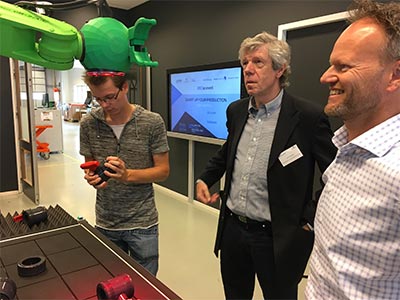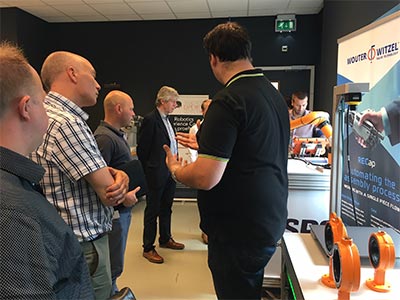Dutch Manufacturers Urged to Embrace Robotics at RECap Event
 Makers and manufacturers gathered at the Robotics Experience Centre in Almelo on Friday to listen to Wittenborg and other RECap-partners explain the growing relevance of robotics in production processes, and how they can apply it to their own businesses.
Makers and manufacturers gathered at the Robotics Experience Centre in Almelo on Friday to listen to Wittenborg and other RECap-partners explain the growing relevance of robotics in production processes, and how they can apply it to their own businesses.
RECap is short for the Robotics Experience Centre Testing Ground Project. Wittenborg is one of the education partners in this exciting project, which advances robotics technology in the eastern provinces of the Netherlands - something the partners hope will strengthen the country’s Smart Industry overall and result in employment growth.
Wittenborg CEO, Maggie Feng, and its Financial and Quality Manager, Harry Maatjes, held a workshop where they set out the changes robotics will bring in the work environment and the development of current employers within the Smart Industry.
 The project is a collaboration between ESPS – the manufacturer behind the Robotics Experience Centre in Almelo and also a member of the WWINN Group – SMEs, Conway as well as industrial end users Vernay Europa B.V. and Wouter Witzel Eurovalve. The knowledge partners are WUAS and the University of Twente.
The project is a collaboration between ESPS – the manufacturer behind the Robotics Experience Centre in Almelo and also a member of the WWINN Group – SMEs, Conway as well as industrial end users Vernay Europa B.V. and Wouter Witzel Eurovalve. The knowledge partners are WUAS and the University of Twente.
Feng said robotics will give manufacturers a competitive edge in their distinctive markets – both locally and internationally. “Proven technology is also becoming more and more affordable. There is no universal manual for robotisation, but the possibilities are endless through the flexibility of robots and computer programmes.”
According to Feng, a people-centred robotisation implementation strategy is needed, based on current organisational culture. Wittenborg is looking towards developing a unique MBA programme catering to the management needs of smart industry, and is also providing training and workshops in that regard.
Two Wittenborg researchers, Dr Abdul Rauf and Dr Alexander Bauer, are contributing to the project by doing extensive research around the effects of robotic implementation on product development, innovation and cost efficiency. They will also look at what management skills the smart industry will require in the future, what management study programmes are available to cater to industry needs, and what is the current status of robotic manufacturing in SMEs.
WUP 25/6/2017
by Anesca Smith
©WUAS Press